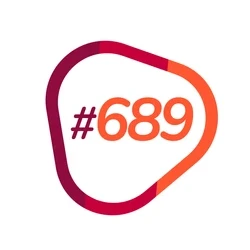There’s nothing wrong with doing so. Perfectly up to you, and everyone would know how much it is.
I sometimes use millitonne (mt) instead of kilogram to keep people on their toes. I’ve learned that some people doesn’t like to have their weight measured in any kind of tonne.
As someone not born to the metric system but who’s tried to lean into it, this is something I’ve always found a little difficult. “A thousandth of a meter” isn’t a useful concept to me. I don’t think we are good at conceiving of things in their thousands, with good proportionality. I would rather just have a singular name like “squajibbles” for milimeters and memorize an intuitive sense of what that is. I realize I can do that with the word “milimeters” too but my brain sometimes gets stuck on unpacking the math. I was reading Dune last night and the expression “millions of decaliters” really stopped me in my tracks. I felt like I had to start with one liter, a sodastream bottle, and multiply it up. I’d rather have some concept like “fuckajiter” which means an Olympic swimming pool and work with that.
Not really being critical here. Metric is better. But intuitiveness is one of the qualities of a measurements system that makes it more or less appealing and I’ve always found imperial has a slight edge there that makes it harder to just drop as a complete loser of a system.
EDIT: yes, internet, I know the only legal thing to say about metric / imperial is that metric is the only system and imperial is for American asshole cavemen. Oh well. Fuck me for offering thoughts from someone trying to move to metric. I should hide my shame.
I would rather just have a singular name like “squajibbles” for milimeters and memorize an intuitive sense of what that is. I realize I can do that with the word “milimeters” too but my brain sometimes gets stuck on unpacking the math.
This is, in fact, exactly what metric users do in their daily lives… We don’t do math in our heads every time we measure something. We know from experience how large all the units are and pick the one that’s appropriate for a given situation, just like you do.
When you measure something using inches, you don’t then say “it’s this many 1/36ths of a yard” unless you specifically need to convert it into yards for some reason.
Similarly, when we measure something using millimeters, we don’t say “it’s this many 1/1000ths of a meter”. It’s just a millimeter. Don’t get hung up on the prefix, just ignore it and treat it as a unit of a particular size.
The point isn’t to have an intuitive sense of what a millimeter is just by knowing what a meter is. You have to learn both units individually to have intuition about them. The point is to know that a measurement of 500mm is 0.5m without having to do any math in your head beyond moving a decimal point.
Coming from the UK generation that grew up during the decimalisation process, and therefore being equally comfortable with both systems, imperial measures are far less intuitive than metric. Don’t mistake simply being being used to something as it being intuitive.
We use a base 10 numeric system because that’s how many fingers & thumbs we have. Having a system of weights and measures based on that decimal system, is far more intuitive than a system that scales up through orders of distance using different scaling factors at ever order, is so unintuitive as to be absurd.
if you actually use the metric system, millimeter would become that “singular name” you memorize for a certain length. but you could also tell from the name alone what’s it about roughly, squajibbles on the other hand…
Intuitiveness comes with usage. When I think of a kilometre, I don’t think of a lot of metres, I just think of it as a single unit. A centimetre doesn’t send me dividing metres, I just think of a length about the width of a fingernail.
Wait isn’t imperial the one with asinine fractions?
Like wtf is a 64th of an inch? Or a thousandth (is that how you spell that?)
I noticed this with vehicles. Odo has 100,000 km on it? Nah, it’s 100 megameters. It just sounds cooler
deleted by creator
Units closer related to everyday stuff are those that stick around. Like horse power or km. People don’t use Mm but instead 1’000s of km, even into the million km for cars. Even in space they still tend to use km like for the distance to the moon or sun. Only once the distances get absurdly large is there a shift to either another unit (light years) or the use of different notation (like 3.14E12 m).
As a Swede, using units that give numbers above ~100 starts to get unwieldy. Hence why we use mil (1 Scandinavian mile = 10 km) once we get to triple digits in km. “It’s 60 mil to Stockholm” is immensely more natural than “it’s 600 km to Stockholm”.
That is fascinating! I had heard of the “metric mile” as being 1500m: the closest you can get to running a statute mile at international competitions.
But I like this 10km mile idea! We could use something like that here in Canada. Sometimes we say “klick” here to mean km, so I have tossed around terms like “decaklick” and “hectoklick” but people look at me funny.
We’ve had different mil definitions in Scandinavia before, but at some point Sweden and Norway agreed to unite at 10 km, which is a really useful unit. Denmark just didn’t do it. They’ll give distances in hundreds of kilometers.
I love this! Let’s use all the prefixes!
It’s always been a pet peeve of mine that Sweden is seemingly the only country that uses dl (deciliter) and hg (hectogram, but we just say hekto, just like with kilo), which are to me vastly more useful units as they’re close to what you’re measuring. 2 hg salami or candy or whatever instead of 200 g, and 3 dl water instead of 30 cl or, god forbid, 300 ml.
I see cooking shows from countries that normally use imperial, using metric by measuring everything in milliliters. It makes no sense! No recipe needs that resolution.
The astronomical unit AU is commonly used for things in the solar system. 1 AU is roughly the average distance to the sun, about 150 000 000 km
I measure my fuel consumption in square millimeters, thank you very much.
I get the joke. But it does not actually work. The unit is meter (to some power) but it is not the same meter. One is for a specific liquid, the other for a driving distance. That information was just omitted to begin with, since everyone knows what is meant with the regular units/expression. But when you would want to do that, you need to put that information back at the end.
I know the metre has been defined by earth’s size, or other various things, all rather arbitrary. Wouldn’t it make sense to define it by the speed of light and a light year, divided into even portions? Start by dividing a light year (in a vacuum) by ten, and keep dividing by ten until we get a unit that is close to the useful size we are accustomed to?
That way we could scale up, and I suppose that’s going to be useful in the future.
Earth’s circumference is 40 Mm. 1 AU is 14 Gm. I could get used to this.
The moon is 400Mm away. Never say thousand kilometers again, the mega is the way.
Imaging if we started saying millions of kilobytes instead of GB.
The Andromeda galaxy is ~23.6 Zm away. The metric system reaches far.
One magnesium please. yes I’m sure, only one.
One single atom?
one mole ?
What do blind, tunnel burrowing animals have to do with it?
chemistry mole
Megagram is the official SI term for the weight. Metric tonne is non-SI but happens to be equivalent to a megagram and became the more common parlance (where I am, at least) by historical accident.
Pretty sure they tried to mimic existing unit’s/terms to make it “easier”. So they used tonne to mimic ton.
They didn’t mimic existing units, an imperial ton is close to a metric ton, and the spelling tonne is just an alternative spelling of ton. In some parts ton means imperial ton, and tonne means metric ton, but it’s not standardized. In German, where the word originally comes from, it’s Tonne (btw the e is not silent, it’s [ɛ] as in let. Or in Porsche (no, it’s not pronounced porsh…).)
They mimicked existing terms, otherwise we wouldn’t have ever had the term metric tonne. It would have been called a megagram.
I like metric wrenches, if my 5mm doesnt fit I can try the 6mm. Most nuts and bolds are not metric, so I end up figuring what comes next if my 1/2" doesn’t fit. is it like 33/64th? 34/64th? 17/32nd?
What is this metric shit? I’m an American! I measure weight in American units like the hundredweight and the truss and the slug!
I don’t know what a hundredweight is, but I’m just guessing based on American experience that it’s a unit of volume equal to 132 quarts.
1 hundredweight = (1 qt * 32) + 100.7, of course. It’s very intuitive.
u guys mesure pressure with elephant stomps per giraffe square feet
burgers per bald eagle
Chevrolet camaros per gun.
Ar15s per school shooting.
Sounds good to me 👍
Seconded. Who do we need to update?
I’ll call the king!
Ummm… I seem to have misplaced the number.
No worries he prefers email these days
But then what would a metric fuckton be?
A Megafuck.
Yes I require 10 Megafucks of gravel to finish with the landscaping
2.2 shitloads.
I’m an engineer, and I make it a point to teach young engineers that “a ton” can mean any one of three things:
- Short ton = 2000 lb
- Long ton = 2240 lb
- Metric ton = 1000 kg = ~2204 lb
And which is being used is often not spelled out, but is just known from context, and usually should be clarified. I once nearly got in trouble by thinking a measurement was in short tons when it was actually metric tons.
So my own act of rebellion is to use “Mg” when I’m writing my personal notes.
There is metric ton and this imperial shit. And thanks to metric being highly systematic, “Mg” (megagrams) is actually correct - “ton” is just a shorthand.
After reading the comments, I’ve noticed a point that is missing from the other comments. We like to measure things relative to other things. Therefore we should use a unit of measure which you can compare the entire range of expected values for that question simply.
For example how far away is my nearest town centre? 1km. How far away is the nearest city? 10km. How far is it across the country? 500km, How far is it across the continent? 5,000km. How far is it around the equator? 40,000km.
By using all km in this case it’s easy to get an idea of the relative distances. But you wouldn’t measure your height as 0.0018km. Just my own thoughts!
That’s what unit prefixes are for… you can measure your height in cm
Exactly!
Lol imagine a country only 500km across.
I prefer Gigamilligram
In Italian schools they teach it as Megagram, since ton is an old term which is non compliant with the SI













